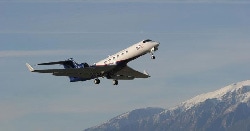Aircrew Safety & Health – Reproductive Health

Photo courtesy of Julie Haggerty (NCAR)
What you need to know
Working as a flight attendant or pilot may affect your reproductive health because of some of the hazards of the job, such as:
- Cosmic ionizing radiation
- Circadian rhythm disruption (jet lag) or shift work
- Working when you would normally be asleep
- Long working hours
- Working across time zones
- Physical job demands, such as:
- Standing for long periods of time
- Heavy lifting
- Bending from the waist
Here you can learn more about possible reproductive health concerns from working as a crewmember and ways to stay healthy.
Why might aircrew be concerned about reproductive health and in-flight exposures?
- Exposure to ionizing radiation at work could increase your chances of having reproductive health problems. For flight attendants, a NIOSH study found that exposure to 0.1 mGy (0.36 mSv) or more of cosmic radiation in the first trimester may be linked to increased risk of miscarriage. Learn more about cosmic radiation and what you can do to reduce exposure.
- NIOSH and NASA have found that a pregnant flight attendant who flies through a solar particle event can receive more radiation than is recommended during pregnancy by national and international agencies
- Cosmic radiation exposures on aircraft include both galactic cosmic radiation, which is always present, and solar particle events, or “solar flares”. Solar particle events are transient, unpredictable solar surface eruptions of radiation.
- Exposure to a solar particle event doesn’t happen often. We estimated that pilots fly through a solar particle event about 6 times over an average 28-year career.
- Working during your normal sleep hours can change your circadian rhythms, which regulate your menstrual cycle and your pregnancy hormones. For flight attendants, working during normal sleep hours 15 hours or more during the first trimester of pregnancy has been linked to increased risk of miscarriage in our study.
- Heavy lifting, standing for long periods of time, or bending a lot during pregnancy could increase your chances of having menstrual disorders, miscarriage, or preterm birth, or injury during pregnancy. For flight attendants, our study found that high physical job demands (standing and walking more than 8 hours a day or bending at the waist more than 25 times a day) was linked to increased risk of miscarriage.
What is not known?
- We don’t know what causes most reproductive problems. If you are exposed to cosmic ionizing radiation, shift work, long working hours, or physical job demands and have a miscarriage or other reproductive problems, we can’t tell if it was caused by your work conditions or if it was caused by something else.
- We don’t know what levels of these exposures are safe for every person, or how to achieve safe exposure levels for all pregnant crewmembers.
What can be done to improve reproductive health among crewmembers?
- Pregnant crewmembers should try to reduce physical job demands including standing for long periods of time, heavy lifting, and bending from the waist.
- Bidding for a flight schedule to reduce circadian disruption exposures is complicated, because reducing one exposure may increase another. Seniority, lifestyle, and personal issues also affect the ability to make these choices. In general:
- Try to reduce your time working on flights when you are normally asleep at home. One way you may be able to do this is to work shorter flights near where you live.
- To reduce cosmic radiation exposure, try to reduce your time working on long flights, flights at high latitudes, or flights which fly over the poles.
- As much as you can when you fly, be aware of space weather and solar particle events by using information from NASA and NOAA prediction systems.
- Learn more about circadian disruption in aircrew.
For more information
- Association of Flight Attendants
- View an infographic on provisional weight limits for lifting during pregnancy
- Learn more about breastfeeding for working mothers
- Work and Fatigue
- National Sleep Foundation Shift Work Website
- If you have safety and health questions about your job contact CDC-INFO.
